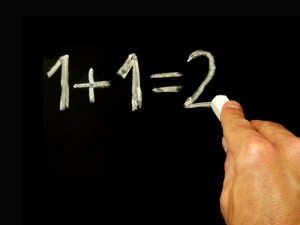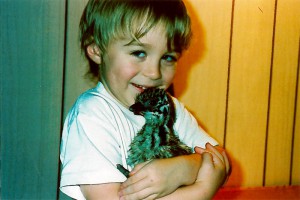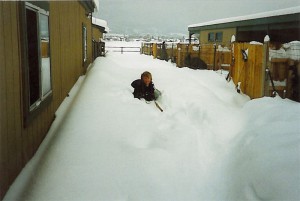What is preventing you or your children from achieving your potential? Often at the top of the list is simply the ability to take in information (short-term memory), manipulate information (working memory), and to think (executive function). Many teachers are just talking to themselves because their students can’t process what is being said. In this video I also mention that The NACD Foundation’s Simply Smarter Project is working to help people understand how well they “think” and is teaching them how to do it better. You and your children can go online and take a quick test and find out how you are doing. Don’t be scared; you can learn to do it better.
Category Archives: Child Development
Politicians and Educators: Wake Up and Stop Screwing Up Our Kids
 I finished my day today with a really terrific family. Three months ago I saw their nine-year-old daughter, Mandy, for the first time; today was their first revisit. Mandy’s parents brought her to us because of a plethora of issues, including a full range of academic problems and memory issues, being fearful and distractible, having fine motor, gross motor, and coordination concerns, avoidance behaviors, difficulty with peers, sensitivity to sounds, tics, etc.–a fairly typical mixed bag of issues.
I finished my day today with a really terrific family. Three months ago I saw their nine-year-old daughter, Mandy, for the first time; today was their first revisit. Mandy’s parents brought her to us because of a plethora of issues, including a full range of academic problems and memory issues, being fearful and distractible, having fine motor, gross motor, and coordination concerns, avoidance behaviors, difficulty with peers, sensitivity to sounds, tics, etc.–a fairly typical mixed bag of issues.
Today I saw a new Mandy. After three months of home program/home school, Mandy advanced a full academic grade level. Her short-term memory, working memory, and executive function has moved from being of significant concern to being “typical” and should continue to move forward; her motor skills have improved; she is much more confident and tolerates the noisy world much better. These are outcomes that we tend to expect. But because of the changes Mandy’s parents have seen in her, they both decided to come in themselves for assessments and programs.
Both of these parents are smart, great people, and although they are both about 40, neither has really recovered from the experience of school.They both have issues and baggage, largely created by the school/educational experience, issues that they have been carrying around and trying (largely unsuccessfully) to cope with since their days in school. Both have poor self-esteem, are insecure, and are a reflection of our educational system–a system that, rather than helping all of us unique individuals succeed, has done an absolutely incredible job of ignoring a basic fact that we actually have brains and that there are these wonderful things called “potential” and“brain plasticity.”Neuro/brain plasticity is an innate brain function that is basic to who and what we are and what we can be, as is breathing.Brain plasticity is not a new concept or new information. It has been acknowledged since the late 1800s.It has been at the foundation of our work at NACD since the organization’s inception in the late ‘70s. So how can it be that our educational system is and has been focused on curriculum and not building and developing brains and unique individuals? The system still maintains a “the-more-we-throw-at-them-the-more-we-hope-sticks” educational model, believing that to achieve better outcomes they just need more hours per day and days per year to throw more crap at students. Then the mindset appears to be: “It’s not working, so lets’ do more of it, and let’s throw a couple of hours of useless homework on top just to make sure that the majority of kids not only don’t really learn anything, but let’s teach them to really hate learning everything and teach them that they are broken in the process.”
We all have incredible potential. Those in control of public and most private education need to forget about coming up with another 1000 reading and math programs, throwing out more books and replacing them with modifications of what they have just thrown out. Forget about throwing more random crap at kids with the hope that some of it will stick. Stop taking kids who love learning and teaching them to hate learning anything. Please acknowledge that we are all amazing and unique individuals with incredible potential. Please stop trying to fit us all into a narrow model and calling us diseased (LD, ADD, ADHD, dyslexic , Asperger’s, etc.) if we don’t fit their perception of who and what we should be and with a little attention to just the basics of developing brains and turning kids on to learning, we can change their futures and our future.
Mandy is just getting started. She’s going to be a happy, confident star, as most of our children could and should be, and her brave parents are going to learn that they are actually quite smart and that it isn’t too late for them to raise the bar and achieve, feel good about themselves, and be great.
Related links:
The NACD Simply Smarter Project – http://www.nacdtheproject.com/
The Learning Environment by Robert J. Doman Jr. – http://www.nacd.org/journal/article16.php
NACD Education Video Series – http://www.youtube.com/playlist?list=PLDC00943D1D09709A
Unlocking the Potential – From the Brilliant Baby Series
How do we help our children achieve? How do we move beyond labels, particularly that of just being “typical/average,” to really make our children successful? Neuroplasticity–how our brains are stimulated and used determines how they become wired. Brains change. We need to make sure they change in good ways. We can build on strengths and identify inefficiencies or weaknesses, provide a child with appropriate input/stimulation, and change their brain. How cool is that?
Emus in the Snow – On Becoming Highly Capable
 Yep, it’s true. Those are emus; they are in the Utah mountain snow, not in the Australian outback; and that little guy is my son, Laird, who was about five at the time. He was shoveling paths to the bird pens so we could get them food and water and hopefully gather their eggs before they froze. We really liked collecting those big green eggs, which we incubated and hopefully hatched into chicks. Back then those chicks were worth about $5,000 each. (I bet you thought I was crazy. As they say, “like a fox.”) In one of the chapters in my life I was a child developmentalist/rancher and raised emus and other exotic critters in the mountains of Utah. It was great fun, a family learning experience, adventure, a particularly great opportunity for my younger son Laird and fortunately generally financially rewarding, helping to support my work with kids. Laird learned about chores early and loved not only being a “helper,” but learning to assume responsibility and not to fear big tasks–Herculean tasks.
Yep, it’s true. Those are emus; they are in the Utah mountain snow, not in the Australian outback; and that little guy is my son, Laird, who was about five at the time. He was shoveling paths to the bird pens so we could get them food and water and hopefully gather their eggs before they froze. We really liked collecting those big green eggs, which we incubated and hopefully hatched into chicks. Back then those chicks were worth about $5,000 each. (I bet you thought I was crazy. As they say, “like a fox.”) In one of the chapters in my life I was a child developmentalist/rancher and raised emus and other exotic critters in the mountains of Utah. It was great fun, a family learning experience, adventure, a particularly great opportunity for my younger son Laird and fortunately generally financially rewarding, helping to support my work with kids. Laird learned about chores early and loved not only being a “helper,” but learning to assume responsibility and not to fear big tasks–Herculean tasks.
 One of my favorite memories involves the building of our home and developing our ranch. Shortly after we moved into our new home, two landscapers were coming up to put in a sprinkler system around the house. They would arrive early, like 6:30 a.m., to begin work. When they arrived Laird would be waiting for them with his little wheelbarrow and shovel, ready for work; and work he did. I have no doubt that those guys worked harder and faster than ever because they had this little kid pushing right beside them, never wanting a break. When the system was almost complete, the last guy on the job was putting the final pieces together in the in-ground control box. Three-year-old Laird couldn’t help with that task, so he on his own accord went and found his little folding chair, one of his reading books (“Bibs”), set the chair up next to where the guy was working, sat there, and read the entire book to him. If he couldn’t help, he could entertain.
One of my favorite memories involves the building of our home and developing our ranch. Shortly after we moved into our new home, two landscapers were coming up to put in a sprinkler system around the house. They would arrive early, like 6:30 a.m., to begin work. When they arrived Laird would be waiting for them with his little wheelbarrow and shovel, ready for work; and work he did. I have no doubt that those guys worked harder and faster than ever because they had this little kid pushing right beside them, never wanting a break. When the system was almost complete, the last guy on the job was putting the final pieces together in the in-ground control box. Three-year-old Laird couldn’t help with that task, so he on his own accord went and found his little folding chair, one of his reading books (“Bibs”), set the chair up next to where the guy was working, sat there, and read the entire book to him. If he couldn’t help, he could entertain.
(Isn’t amazing that our educational system can take little children who love working and love learning and in twelve years teach them that “work” is a four letter work and to hate learning anything? I think the system is broken–how about you?)
 Laird happily requested more and more jobs on the ranch. The young emus needed to be exercised to strengthen their legs, so Laird would run up and down the chick pens with these three-four foot tall chicks/creatures often towering over him. (If you haven’t seen an emu up close, they have big, clawed feet and look more like velociraptors than birds.) When he was a bit older he would be out before daylight in below zero weather, dragging forty-pound bails of hay out to our Scottish Highland cattle. He did these chores willingly, always looked for more, and was justifiably proud of himself and his achievements. Teaching our children to take care of themselves is huge. Raising children to be adults requires more than teaching them the “three Rs;” we need to teach them to be “highly capable.” I know of families whose children don’t know how to do their laundry, buy or prepare food, or clean their living space; who don’t understand the value of money nor how to be responsible; and yet they are sending them off to expensive colleges. Their odds of success are not great.
Laird happily requested more and more jobs on the ranch. The young emus needed to be exercised to strengthen their legs, so Laird would run up and down the chick pens with these three-four foot tall chicks/creatures often towering over him. (If you haven’t seen an emu up close, they have big, clawed feet and look more like velociraptors than birds.) When he was a bit older he would be out before daylight in below zero weather, dragging forty-pound bails of hay out to our Scottish Highland cattle. He did these chores willingly, always looked for more, and was justifiably proud of himself and his achievements. Teaching our children to take care of themselves is huge. Raising children to be adults requires more than teaching them the “three Rs;” we need to teach them to be “highly capable.” I know of families whose children don’t know how to do their laundry, buy or prepare food, or clean their living space; who don’t understand the value of money nor how to be responsible; and yet they are sending them off to expensive colleges. Their odds of success are not great.
I will be writing an article for our NACD Journal and newsletter shortly talking about the concept and perception that we need to help our children become “highly capable.” This is a very important concept for all of our kids, not just our “typical” kids.
(Laird is now 24, working on completing his degrees, and functions as the Chief Operating Officer of NACD. Laird spent last summer in Paris, studying international marketing on a full scholarship.)
One last thought: When it comes to doing things in and around your house, if your kids could do it, then perhaps they should do it.
Related Links
Here Comes Super Bowl XLVII – CTE Chronic Traumatic Encephalopathy
 Next Sunday a huge percentage of our population will be watching the Super Bowl. I won’t be one of them. I will actually be seeing kids in Cincinnati, or I would probably be one of the millions watching the game. I honestly try to watch the Super Bowl more as a piece of cultural literacy than out of a great passion for watching the sport. My passion for organized football ended in junior high school in my very first and last “organized” football game. My coach directed me to go in and “take out” a player on the other team. I proceeded to walk off the field, never to return.
Next Sunday a huge percentage of our population will be watching the Super Bowl. I won’t be one of them. I will actually be seeing kids in Cincinnati, or I would probably be one of the millions watching the game. I honestly try to watch the Super Bowl more as a piece of cultural literacy than out of a great passion for watching the sport. My passion for organized football ended in junior high school in my very first and last “organized” football game. My coach directed me to go in and “take out” a player on the other team. I proceeded to walk off the field, never to return.
This morning, Sunday January 25, on ABC News- This Week, I heard George Will make some meaningful statements about football, statements that mirrored my own thoughts. George Will said, ”The most important letters in football are not NFL, but CTE, Chronic Traumatic Encephalopathy, the cumulative impact of brain damage of small unrecognized, unrecorded impacts in a game that is inherently dangerous.”
My boys wanted to play football, but I would not permit it. Spending your life trying to fix brains tends to give you tremendous respect for an intact healthy brain. If we are fortunate enough to have healthy children, we really need to do everything we can do as responsible parents to protect and nourish that brain. We parents are responsible. These decisions as to whether our children engage in inherently dangerous activities are not their decisions to make; they are ours. In like manner it’s not our children’s decisions as to whether they eat healthy food or do the things that are required to learn responsibility or to develop their brains or become educated. As adults they can make all the decisions they want; but responsible parents do not abdicate important life altering decisions to children who are ill equipped to be making such life altering choices. As parents you can decide whether or not football is safe and establish your own opinions on nutrition, education, and everything else concerning your children; but you need to be the one making the decisions, not your children. In the end you are responsible for the consequences; they just have to live with them.
